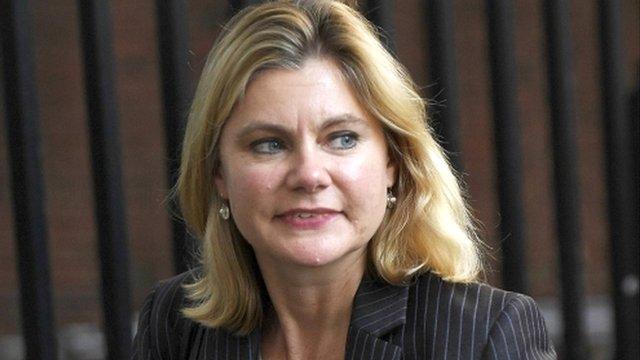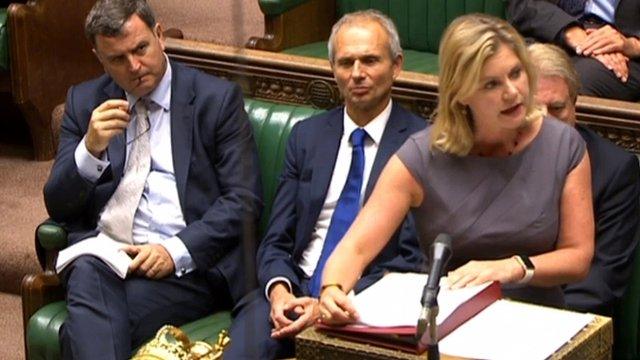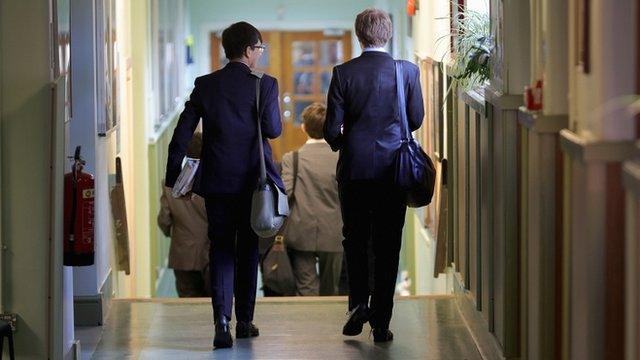Greening announces social mobility 'opportunity areas'
- Published

Justine Greening wants to target social mobility "cold spots"
Education Secretary Justine Greening has announced six "opportunity areas" in England in a £60m scheme to promote social mobility, supporting schools and links with employers.
The first areas will be Blackpool, Derby, Norwich, Oldham, Scarborough and West Somerset.
Prime Minister Theresa May earlier defended her plans for more grammars.
She said poorer pupils did better in grammars - and the ban on expanding selection by ability was "wrong".
But Labour's shadow education secretary Angela Rayner said the plans for grammars showed the Conservatives were "backward looking" and "obsessing about old-fashioned, discredited policies".
The education secretary, speaking to the Conservative party conference, said Labour's opposition to the plans for more grammars was "rank hypocrisy".
Parental choice
Ms Greening told the conference "we should support parental choice, not ignore it" and suggested that the expansion of selection would depend on local demand.
"Local areas who want more grammar places should be able to have them and similarly, local areas who want to stick with the existing schools that they're happy with will be able to do that too."
Ms Greening said her plans to tackle social mobility "cold spots" would give pupils "the best start in life, no matter what their background".

The government says its plans for grammars will promote social mobility
"I want to see businesses spotting and polishing up the talent of a new generation - the rough diamonds - to make sure we unlock the talent of everyone in our country."
After the initial six opportunity areas, there will be a further four to be announced at a later stage, with the 10 areas sharing funding of £60m.
"Ensuring all children can access high-quality education at every stage is critical. This is about giving children in these areas the right knowledge and skills, advice at the right time, and great experiences," said Ms Greening.
Education services and businesses in the opportunity areas would work to "create the opportunities outside school that will raise sights and broaden horizons for young people".
There have been repeated warnings about the lack of support for careers services in schools - particularly in providing young people with individual advice.
The plans announced by the education secretary will mean a greater focus on links with industry and better careers guidance.
Schools in the "opportunity areas" will be partnered with successful schools and head teachers in other parts of the country.
The push for social mobility is also part of the government's controversial proposals to create new grammar schools.
Speaking earlier, the prime minister said she wanted to open up places in grammar schools which are "overwhelmingly good or outstanding".

Theresa May says selection exists in the form of "selection by house price"
"If you look at the attainment within grammar schools, poorer children do better in grammar schools than they do in other schools," said Mrs May.
The prime minister said "selection by house price" already existed for school places - and that there was no reason to block the wider use of selection by ability.
"At the moment we have a law that says if you're setting up a new school, you cannot select pupils by academic ability. I think that's wrong," said Mrs May.
But she said there would not be a return of a "binary system" of grammars and secondary moderns and that the changes were part of a package of reform, including greater involvement of universities and independent schools in the state system and the opening of more faith schools.
"We want to see grammar schools working with other schools, so that the overall quality of education in their area is high. So it's not about what school you go to, it's about making sure you get the education that is right for every child."
Head teachers' leader Malcolm Trobe said he supported the commitment to social mobility.
But he warned that the education secretary needed to address "as a matter of priority" more immediate questions, such as the "severe teacher shortages and significant real-terms cuts in funding".
Labour's Angela Rayner said: "Any new investment into disadvantaged communities is welcome, but the truth is that grammar schools fail the vast majority of children.
"The Tories cannot provide any evidence that new grammar schools will aid social mobility for children from the most disadvantaged communities."
- Published12 September 2016

- Published8 September 2016
- Published15 September 2016
